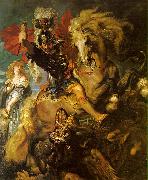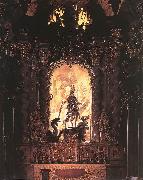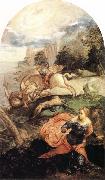
Oil On
Canvas, Real Flavor of Old Masters
|
Peter Paul Rubens
|
|||
|
|
|||
| Flemish Baroque Era Painter, 1577-1640 Peter Paul Rubens (June 28, 1577 ?C May 30, 1640) was a prolific seventeenth-century Flemish Baroque painter, and a proponent of an exuberant Baroque style that emphasized movement, color, and sensuality. He is well-known for his Counter-Reformation altarpieces, portraits, landscapes, and history paintings of mythological and allegorical subjects. In addition to running a large studio in Antwerp which produced paintings popular with nobility and art collectors throughout Europe, Rubens was a classically-educated humanist scholar, art collector, and diplomat who was knighted by both Philip IV, king of Spain, and Charles I, king of England. Rubens was a prolific artist. His commissioned works were mostly religious subjects, "history" paintings, which included mythological subjects, and hunt scenes. He painted portraits, especially of friends, and self-portraits, and in later life painted several landscapes. Rubens designed tapestries and prints, as well as his own house. He also oversaw the ephemeral decorations of the Joyous Entry into Antwerp by the Cardinal-Infante Ferdinand in 1635. His drawings are mostly extremely forceful but not detailed; he also made great use of oil sketches as preparatory studies. He was one of the last major artists to make consistent use of wooden panels as a support medium, even for very large works, but he used canvas as well, especially when the work needed to be sent a long distance. For altarpieces he sometimes painted on slate to reduce reflection problems. His fondness of painting full-figured women gave rise to the terms 'Rubensian' or 'Rubenesque' for plus-sized women. The term 'Rubensiaans' is also commonly used in Dutch to denote such women. | |||
|
|
|||
|
|
St George and the Dragon Peter Paul Rubens9.jpg Painting ID:: 3649 Visit European Gallery |
1606-07 Museo del Prado, Madrid | |
Height Width |
INS/CM |
||
|
X |
|
||
|
|
|||
|
ASAM, Egid Quirin
|
|||
|
|
|||
| German Baroque Era Sculptor, 1692-1750 Sculptor, stuccoist, painter and architect, son of Hans Georg Asam. After working with his father, he was apprenticed to Anton Faistenberger in Munich to learn sculpture. He presumably accompanied his brother Cosmas Damian Asam to Rome (1711-13), where he studied works by Bernini. In 1724 he became a valet and court stuccoist to the Prince-Bishop of Freising and in 1730 a valet to the Elector of Bavaria. | |||
|
|
|||
|
|
St George and the Dragon new4/ASAM, Egid Quirin-238495.jpg Painting ID:: 32237 Visit European Gallery |
1721 Gilt stucco | |
Height Width |
INS/CM |
||
|
X |
|
||
|
|
|||
|
UCCELLO, Paolo
|
|||
|
|
|||
| Italian Early Renaissance Painter, 1397-1475 Italian painter, draughtsman, mosaicist and designer of stained glass. His work vividly illustrates the principal issues of Florentine art during the first half of the 15th century. Trained within the tradition of the Late Gothic style, he eventually became a leading exponent of the application of linear perspective based on the mathematical system established by Filippo Brunelleschi and Leon Battista Alberti. It is the merging of these two diametrically opposed tendencies that forms the basis of Uccello's style. As well as painting on panel and in fresco | |||
|
|
|||
|
|
St George and the Dragon new9/UCCELLO, Paolo-998624.jpg Painting ID:: 33375 Visit European Gallery |
mk86 c.1455 Tempera on canvas 57x74cm London,National Gallery | |
Height Width |
INS/CM |
||
|
X |
|
||
|
|
|||
|
Tintoretto
|
|||
|
|
|||
| Italian Mannerist Painter, ca.1518-1594 His father was a silk dyer (tintore); hence the nickname Tintoretto ("Little Dyer"). His early influences include Michelangelo and Titian. In Christ and the Adulteress (c. 1545) figures are set in vast spaces in fanciful perspectives, in distinctly Mannerist style. In 1548 he became the centre of attention of artists and literary men in Venice with his St. Mark Freeing the Slave, so rich in structural elements of post-Michelangelo Roman art that it is surprising to learn that he had never visited Rome. By 1555 he was a famous and sought-after painter, with a style marked by quickness of execution, great vivacity of colour, a predilection for variegated perspective, and a dynamic conception of space. In his most important undertaking, the decoration of Venice's Scuola Grande di San Rocco (1564 C 88), he exhibited his passionate style and profound religious faith. His technique and vision were wholly personal and constantly evolving. | |||
|
|
|||
|
|
St George and the Dragon new9/Tintoretto-748735.jpg Painting ID:: 33501 Visit European Gallery |
mk86 c.1550-1560 Oil on canvas 157x100cm London,National Gallery | |
Height Width |
INS/CM |
||
|
X |
|
||
|
|
|||










